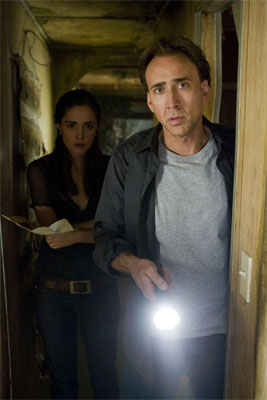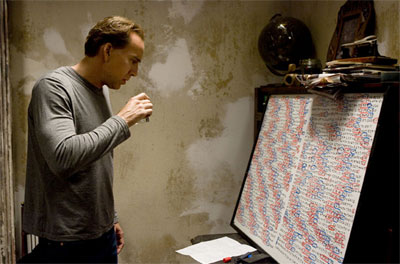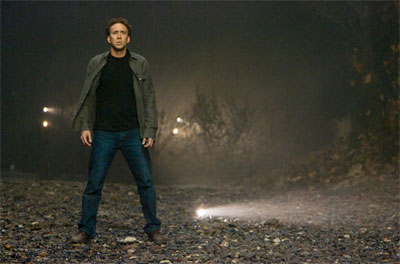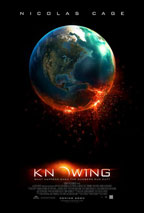Alex Proyas Knowing Interview

THE ALL-KNOWING ALEX PROYAS
EXCLUSIVE Alex Proyas, Knowing Interview by Paul FischerThere's little doubt that Australian director Alex Proyas has a unique take on whatever genre he takes on, from sci fi to film noir, and his latest film, Knowing, is no exception. The film revolves around a teacher (Nicolas Cage) who opens a time capsule that has been dug up at his son's elementary school; in it are some chilling predictions -- some that have already occurred and others that are about to -- that lead him to believe his family plays a role in the events that are about to unfold. Proyas discussed the film with Paul Fischer in this exclusive interview.
QUESTION: When this movie came to you, did you originally see it as being a very conventional kind of thriller and what was it about this material, that you thought you could add the Alex Proyas stamp to it?
ALEX PROYAS: My little touch? I never saw it as being conventional, otherwise, I would have passed on it, like so many other things that I get, that are conventional and I get quite a few of them, believe me. Where I stop reading on page ten. I go, "That's enough. Can't take any more." So, you know, I mean, I look for something that surprises me, and this one did. Firstly, it hooked me with this notion of the time capsule idea. I thought that was kind of a really creepy notion, and had a vague feeling of being this weird urban myth that I hadn't heard before, you know? And then it took me on an unexpected journey. Look. It's very rare that I get a script that I think is perfect, and I can start shooting next week and it's more the case like this one - I see the germ of an idea, and some little pieces in there, then the more I think about it, the more stuff kind of latches onto it. That's when I get excited, when there's a lot of juicy possibilities for layers of ideas, and that's what I worked pretty hard on with this over a few years, to get to work, is to kind of evolve it into something.
You know, it started off its life as a kind of supernatural story. And I aligned it much more to the science fiction genre, and tried to make it as credible as I could and also give it some real layers of meaning, which I think is really important for me. And so if it engages me emotionally and intellectually, and it keeps doing that for me over a period of time, I know I've got something that I can work on, you know? And if I lose interest in it, if the ideas dry up, then it's something that I'm no longer passionate about, you know?
 QUESTION: What sorts of changes did you make to the script once you became involved? I mean, you said you added the sort of science fiction elements to it. Did you work further on developing the Nick Cage character, with a lot more of that?
QUESTION: What sorts of changes did you make to the script once you became involved? I mean, you said you added the sort of science fiction elements to it. Did you work further on developing the Nick Cage character, with a lot more of that?ALEX PROYAS: Yeah all of the above, really. I mean, it became, for me, very much about a sort of spiritual request. And I guess all the stuff that I often do with movies - I mean, my movies are very often about characters in search for meaning, some sort of truth, or meaning and this became very much about that, probably more than anything I've done, in fact. Nick's character starts off living in this sort of universe that he believes to be completely meaningless and random, and chaos-based. And then slowly, he evolves into someone who is looking, at least, for some truth, or some sense of meaning in that universe. And that's something that really fascinates me. So that when it became about that, I made it about that-- I sort of found that in it, to a certain extent, but evolved it. And that's when it started getting exciting for me, you know? And then everything else served that idea, and it became richer, I guess, as we progressed. We did all the character stuff, of course, and the more visceral visual elements, you know? But for me, I always try and find the basic idea. It's not so much that I've got a big, grand statement. But it's like, what is the story? It's not so much, "What is the story saying?" It's, "What does the story mean to me?" You know. "What's the big philosophical concept that I'm exploring?" And once I've found that with this, everything else kind of fell into place.
QUESTION: A lot of your work deals with protagonists who, I guess, have an Everyman quality to them. Is that something you're instinctually drawn to, as a filmmaker?
ALEX PROYAS: I don't know that they're Everymen. I think that they're version of me, I suppose. I think that's the case with a lot of filmmakers. And, you know, they're people I aspire to be, more so than the person I actually am, I guess. I think of them as all - I mean, particularly with Nick's character in this film. I mean, he's someone who is a scientist, so he's very pragmatic, and he believes in logic, and the law of physics, and the world being a very kind of specific place. Then when he decides, discovers that it's not - he has a hard time compensating for that, and dealing with that. And that's kind of me, I suppose. I mean, on a search for meaning, as well. I think as an artist, that's what I'm doing. I'm looking for questions to be answered. But I have more questions than answers. And I don't know whether I ever will have any answers, you know? But it is that search that intrigues me, you know? So all the characters are always looking for something. Looking for some clues to the nature of their existence, or their realities, or their lives, in some way.
QUESTION: So, you're saying that you haven't quite found the meaning of life yet?
ALEX PROYAS: No. But, you know, what this story specifically analyzes is - and, you know, the quest for the meaning of life is such a big thing, and a big, pretentious concept. So you try not to go there. You there and make it very specific, you know? And in Nick's case in this film - I mean, by the end of the film, you could sort of view it as being, he finds - part of his conclusion is that maybe his reason for living is just to be a good father to his son, and that's enough. So, that's his arc, really, in the story. And I think the thing is, even though I'm sort of more interested in questions than answers, I think movies, to a certain extent, have to give some answers to make it a satisfying journey for an audience, you know? So, I try and construct images that are kind of smaller ones, that are to do with the narrative of the film, rather than the big philosophical questions that I'm raising.
 QUESTION: Now you shot in Melbourne. Was there a reason for that? Was it pragmatic? Did you like the idea of working at home?
QUESTION: Now you shot in Melbourne. Was there a reason for that? Was it pragmatic? Did you like the idea of working at home?ALEX PROYAS: Well, I like working in Australia and that's really why we shot it there, because I just prefer to work there, you know? And it means I don't have to uproot my entire life each time. Because it does wear thin, the whole notion of traveling to some other part of the world and setting up your lives there, with my family, for a couple of years, is a very disruptive experience, you know? And I didn't see any real valid reason to really shoot this anywhere other than home, because I felt all the stuff we were going to construct, we were going to construct it wherever we were, anyway. And these days, you can use technology. I mean, you know, there's a bunch of scenes with Nick in New York City. And we just basically put him into New York City. We went and shot all the streets, and we shot him running down the street in Melbourne, and we sort of matted him into New York, you know? And when you can do that sort of stuff so easily now and it looks convincing, then it doesn't really matter where you shoot. And I've never shot a movie where it's set, ever. I've always - you know, I, Robot was set in Chicago, and I shot it in Vancouver. And The Crow was shot in Detroit, and I shot it in Wilmington, North Carolina. So, I figure, like - you know, Melbourne sounds like a good idea to me. You know.
QUESTION: How do you think you've evolved as a filmmaker, since the beginning of your career? And what do you look for now, that perhaps is different than what you might have looked for in the beginning?
ALEX PROYAS: Well, I mean, I guess your journey as an artist is that you learn along the way more precisely what you like and what you don't like, you know? What you need, and what you don't need, in terms of telling a story. And I guess I'm sort of looking for simplicity these days. I actually like - well, it's deceptive, simplicity, because it's simplicity, on one level. It's simplicity on what's on the screen. But there's buried depth beneath that. And that, to me, is kind of the sort of art of it, I suppose, is how little you can show. How little you can explain, and still keep the audience on their journey, you know? That doesn't mean that it's not there. But it's just not overtly there. It's not in your face, you know? And to me, it's like, it's there for people who want to look for it, you know? And that, I think, is the sort of skill, really, that I'm trying to develop.
QUESTION: Do you think technology has taken over filmmaking, to some degree?
ALEX PROYAS: I don't know that it's taken over. I mean, filmmaking has always been a technology. The art form wouldn't exist without the invention of the camera, you know? It's as simple as that - which is a form of technology. So, you know, you could probably say that about every art form. But it's much more pointed in filmmaking terms, you know? And so as the technology evolves, the style of films evolve as well. And I tend to embrace technology. If it can make my life easier, and if I can tell a better story and all that, I think it's fine, you know? There's no harm done.
QUESTION: What do you hope to be doing next?
ALEX PROYAS: I'm not really sure, at this stage. I've got a few bunches of projects floating around, but I don't really have anything that's absolutely locked in right now. You know, you work at certain things at the same time and I'll see how we go with them. I mean, there's one particular project that's sort of a Dracula origin story, that I've been excited about for some time, but we're just having a hard time getting the budget to work.
QUESTION: Is it going to be a Vlad the Impaler story?
ALEX PROYAS: Yeah, essentially. It's kind of the transformation of Vlad into Dracula, and the reasoning behind why he became that creature.
QUESTION: How much of Stoker's source material would you be using?
ALEX PROYAS: Well, you could sort of view it as a prequel to Bram Stoker's novel, really, so, t's very much informed by that. I think a very unique take on the character, because the character has been done to death, quite literally. Boom, boom, boom, pun intended. YI think someone said he was the most filmed character in the history of movies, so it was unlikely, when this project came to me, I thought, "This is unlikely that I ever would do this," but it was such a good script, and had such a unique vision of that character, it took me by surprise. So, I'm quite certain about that, I think.

Knowing
Starring: Nicolas Cage, Rose Byrne, Ben Mendelsohn, Terry CamilleriDirector: Alex Proyas
Genre: Science-Fiction/Fantasy
Nicolas Cage stars in Knowing, a gripping action-thriller of global proportions about a professor who stumbles on terrifying predictions about the future—and sets out to prevent them from coming... Nicolas Cage stars in Knowing, a gripping action-thriller of global proportions about a professor who stumbles on terrifying predictions about the future—and sets out to prevent them from coming true.
In 1958, as part of the dedication ceremony for a new elementary school, a group of students is asked to draw pictures to be stored in a time capsule. But one mysterious girl fills her sheet of paper with rows of apparently random numbers instead.
Fifty years later, a new generation of students examines the capsules contents and the girls cryptic message ends up in the hands of young CALEB KOESTLER. But it is Calebs father, professor JOHN KOESTLER (Nicolas Cage), who makes the startling discovery that the encoded message predicts with pinpoint accuracy the dates, death tolls and coordinates of every major disaster of the past 50 years. As John further unravels the documents chilling secrets, he realizes the document foretells three additional events—the last of which hints at destruction on a global scale and seems to somehow involve John and his son. When Johns attempts to alert the authorities fall on deaf ears, he takes it upon himself to try to prevent more destruction from taking place.
With the reluctant help of DIANA WAYLAND (Rose Byrne) and ABBY WAYLAND, the daughter and granddaughter of the now-deceased author of the prophecies, Johns increasingly desperate efforts take him on a heart-pounding race against time until he finds himself facing the ultimate disaster—and the ultimate sacrifice.
MORE
- Viggo Mortensen The Road
- 24 Cast Reunion
- Aaron Eckhardt No Reservations
- Aaron Eckhart The Dark Knight
- Adam McKay Step Brothers Interview
- Alan Alda Diminished Capacity Interview
- Alan Alda Diminished Capacity Interview
- Alex Dimitriades
- Al Pacino Oceans 13
- Alan Rickman Snow Cake
- Alan Rickman Sweeney Todd



